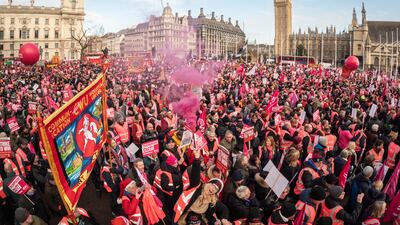British Cabinet minister Oliver Dowden said ministers would be “straining every sinew” to minimise strike disruption to the country, with paramedics, nurses, train staff and border officials among those due to walk out.
The military and civil servants are likely to be brought in to cover for Border Force staff while armed forces will also be sent to hospital trusts before ambulance workers strike on December 21. A month of rail disruption began on Tuesday when workers walked out for their first of a wave of 48-hour strikes,
Mr Dowden repeated pleas for workers to call off action and “give families a break”, but admitted contingency plans to use troops to help fill the gaps would not be enough to “remove all risks”.
“Of course, this government will be straining every sinew to make sure that we minimise those risks, but we cannot eliminate them,” he said.
“The fair and reasonable thing for the unions to do — particularly in a time when winter is biting, we’re suffering from the consequences of Ukraine and indeed the Covid situation — [is] to call off those strikes, give families a break, particularly over winter time.”
“My message to them, even now, is please call them off."
Strikes across the UK - in pictures
Meanwhile, Prime Minister Rishi Sunak’s spokesman said: “We aren’t suggesting there won’t be serious disruption caused by these strikes.”
Admitting there was some unease in the military about government plans to use members to fill jobs affected by strikes, Lord Richard Dannatt, former head of the army said: “Soldiers might decide they’ve had enough of bailing the government out of the muddles it gets itself into.
“They might think, ‘I joined to be a soldier, not a strike-breaker’.”
The first UK-wide strike in the history of the Royal College of Nursing (RCN) looks set to begin on Thursday, with a second date set for Tuesday.
Talks to avert the nursing strike have failed after the union leader behind the action accused Health Secretary Steve Barclay of “belligerence” and refusing to discuss pay.
RCN general secretary Pat Cullen said nurses were “not getting an extra penny” despite her attending talks on Monday, three days before their first strike date.
“The government was true to its word – they would not talk to me about pay,” Ms Cullen said.
“I needed to come out of this meeting with something serious to show nurses why they should not strike this week. Regrettably, they are not getting an extra penny.
“Ministers had too little to say and I had to speak at length about the unprecedented strength of feeling in the profession.
“I expressed my deep disappointment at the belligerence. They have closed their books and walked away.”
London tube strikes - in pictures
The union is demanding a pay rise of 5 per cent above the RPI rate of inflation, which was 14.2 per cent in October, but Ms Cullen has hinted that she could compromise if the government negotiates on pay.
Mr Barclay has been sticking with the independent pay review body’s recommendation of a £1,400 ($1,717) raise.
Nearly half of voters blamed the government for industrial action by nurses and ambulance workers, a YouGov poll published last week showed.
Polling confirmed that weak governments are blamed for industrial unrest and disruption, said YouGov’s Anthony Wells.
Compounding the situation, hopes of a major breakthrough in the rail dispute were also shattered on Monday after Network Rail workers rejected a pay offer.
Members of the Rail, Maritime and Transport union (RMT) will now press ahead with two 48-hour strikes at Network Rail and 14 train companies from Tuesday and Friday.
The RMT said 63.6 per cent voted to reject Network Rail’s offer on an 83 per cent turnout.
Postal workers strike in the UK - in pictures
“This is a huge rejection of Network Rail’s substandard offer and shows that our members are determined to take further strike action in pursuit of a negotiated settlement,” said general secretary Mick Lynch.
“The government is refusing to lift a finger to prevent these strikes and it is clear they want to make effective strike action illegal in Britain.
“We will resist that and our members, along with the entire trade union movement, will continue their campaign for a square deal for workers, decent pay increases and good working conditions.”
Trains will run from 7.30am to 6.30pm on this week’s strike days, although many parts of the country will have no services, including most of Scotland and Wales.
Border Force workers at UK airports to strike over Christmas - video
A strike by members of Unite at Network Rail will not go ahead after they voted to accept the offer.
Network Rail had offered a 5 per cent pay rise for this year, backdated to January, with another 4 per cent at the start of 2023 and a guarantee of no compulsory job losses until January 2025.
The RMT’s executive recommended rejecting the offer, saying it was linked to “significant” changes to working practices.
RMT workers at Network Rail will also strike from 6pm on Christmas Eve until 6am on December 27.
Passengers planning to travel on Christmas Eve will probably be urged to complete their journeys by the time industrial action begins.
























